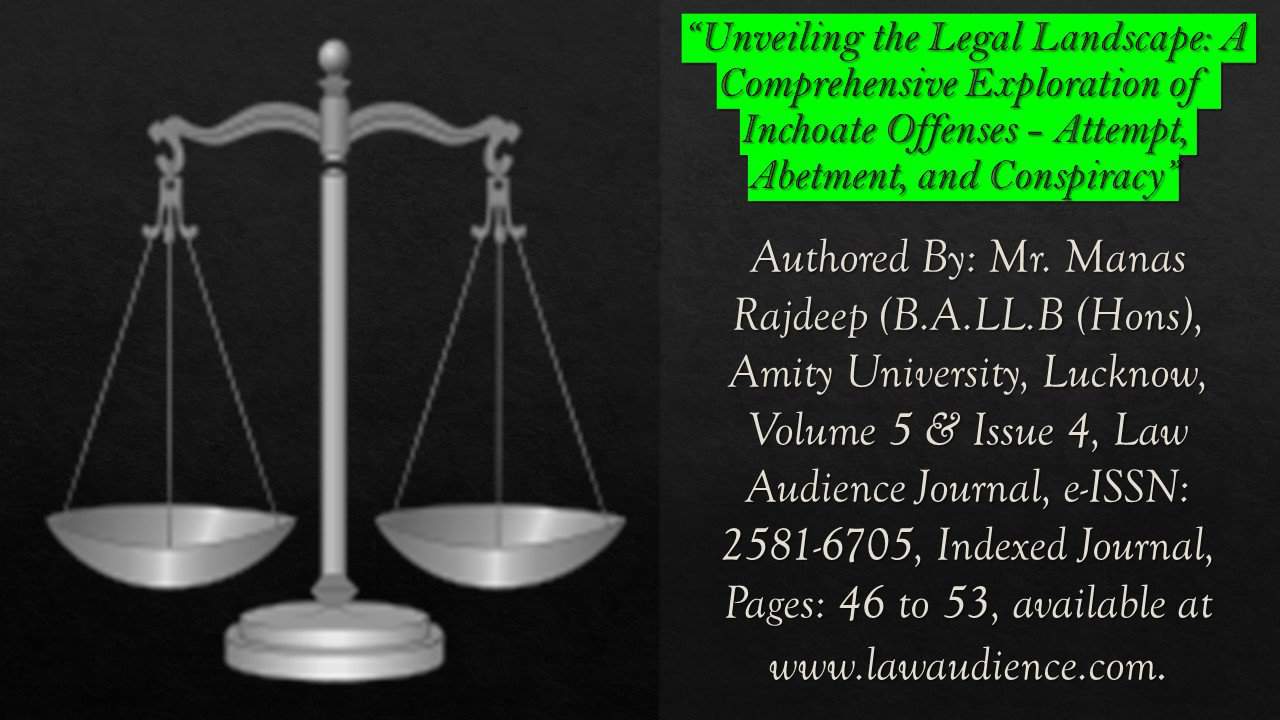Click here to download the full paper (PDF)
Authored By: Mr. Manas Rajdeep (B.A.LL.B (Hons), Amity University, Lucknow,
Click here for Copyright Policy.
I. INTRODUCTION:
“As we all know under IPC there are several Punishments are given for various crimes, and all criminal activities are punishable under the law. But what if any criminal activity is executed but not completed, will it still be an offence, or can we say that an offence is committed. The answer is Yes, these crimes are known as Inchoate offenses”.
II. WHAT ARE INCHOATE OFFENSES?
As a matter of fact, the word inchoate means ‘Undone’ or ‘half-done’. These acts cannot be considered as an offence because they are performed in the process of a mission to do a crime.
R vs. Higgins[1], in this case it was the first time that the concept of inchoate crimes was introduced in the 19th century and the requirement to add more subjects to the definition of inchoate crimes.
We have studied that there are 2 elements of a crime: Mens Rea and Actus Reus. Mens rea talks about the guilty intention of any individual to commit a crime, whereas Actus reus talks about the act of an individual. Inchoate offenses are also known as UNDONE offenses, these are the preparation to commit a crime.
In criminal law, inchoate offenses are involved.
- Attempt to commit a
- Encouraging crime
- Conspiring
A person is not punished for the main crime, they are punished for the tramp they choose to commit a crime. For example, the punishment to an individual in a murder case is stricter than attempt to murder in 307.
III. TYPE OF INCHOATE OFFENCES:
III.I ABETMENT:
According to IPC abetment contains a person who intentionally motivates some other person to commit an illegal act. Basically, it is an act of encouraging or uplifting any other individual to commit any crime. Let’s assume, A guided B in the murder of C, then A is liable for abetment. This offence is paved under chapter 5 of IPC, 1860.
III.II ABETMENT BY INCITEMENT:
Abetment by incitement refers to the act of encouraging, provoking, or urging someone to commit a crime or engage in wrongful conduct. Abetment itself is a legal term that generally involves aiding, counselling, or procuring another person to commit an offense. When abetment involves incitement, it means that the accused has specifically encouraged or stirred up another person to carry out a criminal act. In legal systems, abetment by incitement is considered a form of complicity, where an individual plays a role in motivating or influencing someone else to commit an unlawful act. The person who incites another may not directly participate in the actual commission of the crime but is held accountable for their role in encouraging or facilitating it. Laws regarding abetment by incitement can vary by jurisdiction, but they are generally in place to deter individuals from promoting or stimulating criminal behavior, even if they do not personally carry out the illegal act. Legal consequences for abetment by incitement may include criminal charges and penalties, depending on the severity of the crime incited and the specific laws in place in each jurisdiction. Promttima Dutta vs. State of west Bengal[2], it was the case of dowry death where the victim’s in- laws especially her mother-in-law and his husband had continuously abused her verbally so much that she committed suicide, the court held that the verbal abuse to the victim with connection to dowry demand amounts to instigation and inciting the victim to commit suicide and that Section 306 of IPC provides for the abatement of suicide being and offence.
III.III ABETMENT BY CONSPIRACY:
The term “abetting by conspiracy” implies a situation in which an individual joins a group to commit a crime. In legal terms, a conspiracy is an agreement between two or more individuals to commit a crime; aiding and abetting a conspiracy is the act of actively aiding the conspiracy to carry out its illegal goals. Conspiracy helped or assisted refers to the active encouragement or support of the conspiracy’s actions. Giving resources, information, or support to conspirators knowing they are preparing and attempting to commit a crime might be one way to do this. The exact offense involved, and the jurisdiction can determine the penalties for abetment via conspiracy. Those found guilty of aiding and abetting via conspiracy may be subject to criminal charges and fines in several judicial systems. Like those associated with the underlying crime that was the subject of the conspiracy. It’s important to note that laws can vary, so the specific elements and consequences may differ based on local legal frameworks. Trilochan vs. Karnail[3], Court observed that, if a person is a silent spectator and has not engaged or taken part in the process of commission of the offence, he cannot be held guilty for abetting that offence.
III.IV ABETMENT THROUGH ASSISTANCE:
Abetment through assistance refers to the act of aiding, facilitating, or supporting another person in the commission of a crime. Abetment generally involves encouraging, procuring, or actively assisting someone in the commission of an offense. When this assistance is a key element, it is referred to as abetment through assistance. The act of assisting, supporting, or helping another person in the conduct of a crime is referred to as “abetment through assistance.” In broad terms, abetment refers to motivating, obtaining, or actively supporting someone while they commit a crime. Abetment by aid is the term used when this help is a crucial component. Even if they are not directly charged in the crime, the individual aiding contributes to its facilitation or enabling. This support can come in many ways, such giving out equipment or weapons, giving advice or information, assisting with logistics, or taking part in the illegal activity’s planning phases. The exact rules governing such conduct and the jurisdiction in question determine the legal ramifications of abetment through support. In many legal systems, individuals found guilty of abetment through assistance may face charges and penalties like those associated with the crime itself. The level of involvement, intent, and the nature of assistance provided are factors that can influence the severity of the charges. It’s important to note that the terminology and legal definitions may vary across jurisdictions, so the specifics of abetment through assistance charges can differ based on local laws. Legal systems aim to discourage individuals from actively supporting or facilitating criminal acts, and charges related to abetment are designed to hold accomplices accountable for their role in the commission of a crime. Eshan Meah case[4], where two workers of the factory engaged into wrist fight during the working hours and due to this the owner of the factory out of anger shouted that “I wish I had a weapon to teach both of you a lesson” meanwhile, Eshan one of the labourers heard this and gave the lathi to owner from which he injured the labourers. The court held Eshan guilty for abetment through assistance.
IV. ATTEMPT:
In IPC attempt is not defined, but chapter XXIII mentions the punishment to attempt. Attempt is an offence in which an individual may be punished with imprisonment or life imprisonment according to gravity case.
There are 4 stages of crime to be committed.
- Intention to commit a
- Construction for committing a
- Attempt
- Commission of
Here we have been discussing the attempt. In simple sense the attempt aims towards committing the crime when preparation is completed. Attempt is also an offence, but here the actual offence doesn’t take place. Let’s assume, Mohan tried to kill Suresh unfortunately he misses the target now here the actual crime of murder is not committed. So, Mohan will be charged for the offence of an Attempt to murder under 307 of IPC.
IV.I How IPC deals with Attempt:
- In a few cases, the offense, and their attempt both are assigned with same section and Like section 124A sedition.
- They are sometimes penalized for distinct offenses. For instance, Section 307 prohibits attempts at murder, Section 308 prohibits attempts at culpable homicide, and Section 309 prohibits attempts at
V. CONSPIRACY:
When two or more people decide to carry out a forbidden act and take action to finish the crime, this is called a conspiracy. This is distinct from an attempt, should the crime be successfully committed, the defendant may face charges for both the actual offense and conspiracy to commit the crime.
V.I CRIMINAL CONSPIRACY:
Criminal conspiracy is covered in Sections 120 A and 120 B of Chapter V of the Indian Penal Code. According to this, the act must be carried out by two or more people, and they must have agreed to do either a lawful act using illegal methods or an illegal act altogether. This is an incomplete offense as the crime need not be finished.
For example,
Nitin and Ramesh come together to murder X. but they fail and are unable to kill X. Now both will be charged with the offence of criminal conspiracy, it won’t affect whether the crime did not take place. Thus, we have discussed all the main inchoate offences.
State of Maharashtra & ors vs. Somnath Thapa & ors[5], in this case Court acknowledged that, if a person is conspiring with other person, the knowledge and intention of the conspirators must be consensual towards what they are wanting to achieve out of the illegal omission or act.
Furthermore, in the Case of NCT of Delhi vs. Navjot Sandhu[6], Court summarised the conspiracy by the following observations, “A few bits here and a few bits there on which prosecution relies. Cannot be held to be adequate for connecting the accused in the offence of criminal conspiracy[7]”.
VI. DEFENSES TO INCHOATE CRIMES:
Defenses to inchoate crimes are often like defenses against completed crimes but may also involve specific considerations related to the incomplete nature of the offense. Here are some common defenses:
- Impossibility: If it can be shown that the completion of the crime was impossible, the defense of impossibility may be raised. There are two types of impossibility: factual impossibility and legal Factual impossibility occurs when the defendant’s actions could not result in the completion of the crime due to external circumstances. Legal impossibility, on the other hand, involves a situation where the defendant’s actions, even if completed as intended, would not constitute a crime.
- Renunciation or Withdrawal: Some jurisdictions recognize the defense of renunciation or withdrawal. This occurs when the defendant voluntarily abandons or takes steps to prevent the completion of the criminal act after initially participating in the inchoate This defense may show that the defendant had a change of heart and genuinely tried to disengage from the criminal conduct.
- Lack of Intent: If the prosecution cannot prove that the defendant had the requisite intent for the inchoate crime, the defense may argue that there was a lack of intent. Intent is a crucial element in many inchoate offenses and showing that the defendant did not have the necessary mental state may be a valid
- Entrapment: If law enforcement induces or persuades an individual to commit an inchoate crime that they were not predisposed to commit, the defense of entrapment may be raised. Entrapment occurs when the government’s conduct leads an individual to commit a crime they would not have otherwise
- Legal Justification: The defendant may argue that there was a legal justification for their actions, such as self-defense or defense of others. While this defense is more commonly associated with completed crimes, it may be relevant in certain inchoate crime
Barendra Kumar Ghosh vs. king Empress[8], where the privy council held that mere presence of the person at place where offence is committed amounts to abetment, if there was an intention to encourage the offence which was committed.
VII. CONCLUSION:
As a result, numerous crimes attract punishments even without the commission of a crime. These consist of abetment, conspiracy, and attempt. The necessity to add more topics to inchoate offenses is growing as time goes on. Preventing the act of committing the crime is the primary motivation for this. These kinds of offenses are relatively new, and as time goes on, criminal law is becoming more and more refined to create a society that is peaceful. Understanding the complicated nature of criminal responsibility prior to the commission of a criminal act requires an exploration of inchoate crimes. The terms “attempt,” “abetting,” and “conspiracy” refer to distinct phases in the criminal justice process, each with its own set of legal consequences. Analyzing an attempt exposes the importance of intent and a significant advancement toward the commission of a crime. It emphasizes how legally culpable one is even in situations when the intended crime is not entirely committed. The study of abetment examines the participation of individuals who advise, assist, or promote criminal activity. This idea highlights the significance of accomplice responsibility and the part played by those who assist others in engaging in criminal activity. On the other hand, conspiracy investigates the agreement between two or more people to carry out a criminal act. Despite the actual conduct of the crime, conspiracy has implications for law that acknowledge the risks associated with cooperative criminal organizations. In summary, a full awareness of criminal law demands a detailed investigation of inchoate acts. It reveals the specifics purpose, cooperation, and legal consequences of acts committed prior to the commission of a crime. To provide a fair and reasonable application of the law when addressing criminal activity at different phases of its commission, legal systems must carefully manage these complexities.
Cite this article as:
Mr. Manas Rajdeep, “Unveiling the Legal Landscape: A Comprehensive Exploration of Inchoate Offenses – Attempt, Abetment, and Conspiracy”, Vol.5 & Issue 4, Law Audience Journal (e-ISSN: 2581-6705), Pages 46 to 53 (8th March 2024), available at https://www.lawaudience.com/unveiling-the-legal-landscape-a-comprehensive-exploration-of-inchoate-offenses-attempt-abetment-and-conspiracy.
Footnotes & References:
[1] (1801) 2 East 5.
[2] (1977) Cr Lj NOC 96(Cal).
[3] AIR 1968 Punj 416.
[4] (1874) 12WR 527.
[5] (1996 SC) 4 SCC 659.
[6] AIR 2005 SC 382.
[7] https://www.lawctopus.com/academike/inchoate-offences-a-detailed-analysis/
[8] AIR 1925 PC 1, p.6.



